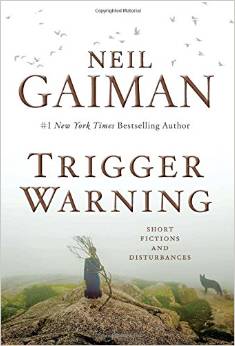 I started reading Trigger Warning by Neil Gaiman today, a collection of short stories and poems. Beautiful writing style. Beautiful story-telling. Unfortunately, I won’t be able to read the whole book. I can’t read any stories that have elements of horror in them. Stories that are too dark. Or creepy. What others find scary but thrilling, I find scary and … scary.
I started reading Trigger Warning by Neil Gaiman today, a collection of short stories and poems. Beautiful writing style. Beautiful story-telling. Unfortunately, I won’t be able to read the whole book. I can’t read any stories that have elements of horror in them. Stories that are too dark. Or creepy. What others find scary but thrilling, I find scary and … scary.
There are several paragraphs in the introduction which explain what Neil Gaiman means by triggers. I copied them below.
Little Triggers
There are things that upset us. That’s not quite what we’re talking about here, though. I’m thinking rather about those images or words or ideas that drop like trapdoors beneath us, throwing us out of our safe, sane world into a place much more dark and less welcoming. Our hearts skip a ratatat drumbeat in our chests, and we fight for breath. Blood retreats from our faces and fingers, leaving us pale and gasping and shocked.
And what we learn about ourselves in those moments, where the trigger has been squeezed, is this: the past is not dead. There are things that wait for us, patiently, in the dark corridors of our lives. We think we have moved on, put them out of mind, left them to desiccate and shrivel and blow away, but we are wrong. They have been waiting there in the darkness, working out, practicing their most vicious blows, their sharp hard thoughtless punches into the gut, killing time until we came back that way.
The monsters in our cupboards and our minds are always there in the darkness, like mold beneath the floorboards and behind the wallpaper, and there is so much darkness, an inexhaustible supply of darkness. The universe is amply supplied with night.
What do we need to be warned about? We each have our little triggers.
I first encountered the phrase “Trigger Warning” on the internet, where it existed primarily to warn people of links to images or ideas that could upset them and trigger flashbacks or anxiety or terror, in order that the images or ideas could be filtered out of a feed, or that the person reading could be mentally prepared before encountering them.
– Neil Gaiman, Introduction to Trigger Warning
Neil goes on to talk about whether trigger warnings are truly necessary in the first place. As adults we get to decide what we want to read. As long as we know that a certain story is “intended for a mature audience”, should we add any warnings to it other than “enter at your own risk?”
His opinion is that no, we shouldn’t. The introduction to his book is very interesting if only because you get to see how he argues his point. I liked it for more than that though.
- I liked it because it gave me a glimpse into his writing philosophy, and his well lived life, and his occasional bouts of writer’s madness.
- I liked it because it was so well written, and fun, and … authentic.
- I liked it because it made me want to read the whole book while helping me decide which stories to stay away from.
Neil doesn’t need trigger warnings. Here is what he says about his own triggers.
There are still things that profoundly upset me when I encounter them, whether it’s on the Web or the word or in the world. They never get easier, never stop my heart from trip-trapping, never let me escape, this time, unscathed. But they teach me things, and they open my eyes, and if they hurt, they hurt in way that make me think and grow and change.
– Neil Gaiman, Introduction to Trigger Warning
For myself, I still need trigger warnings. I can’t get them for real life. I see and hear real stories that hurt me in ways a piece of fiction never could. I see the suffering and total disrespect for human life that’s evident everywhere today. Do they teach me anything? Do they make me think, and grow, and change? Maybe, maybe not. I don’t really know. For the most part they hurt me and they leave me … bewildered. Because I can’t understand them at all. They make no sense to me.
How do you kill someone in cold blood, tape it, and show your act to the whole world? How could you ever justify killing someone in the first place, and even more killing a child? I will never understand that.
I’m sorry. This post is turning into something different than I had originally planned. I guess my point is that when it comes to fiction, I prefer to have trigger warnings. Fiction is an escape for me. If I want to be scared or emotionally hurt, I turn on the news channel or go online. If I want to believe that happily-ever-afters are possible, I turn to fiction.
So, even if I think Neil Gaiman is one of the best writers I’ve read so far, I’ll have to skip some of his stories. Not all though. I actually finished “The Man Who Forgot Ray Bradbury” just a little while ago and loved it. Especially when I read this comments about how the story came to be. Just beautiful!
 Ada Ireland is a pen name I came up with for myself. Unashamed Writing is a name I came up with for my blog.
Ada Ireland is a pen name I came up with for myself. Unashamed Writing is a name I came up with for my blog.